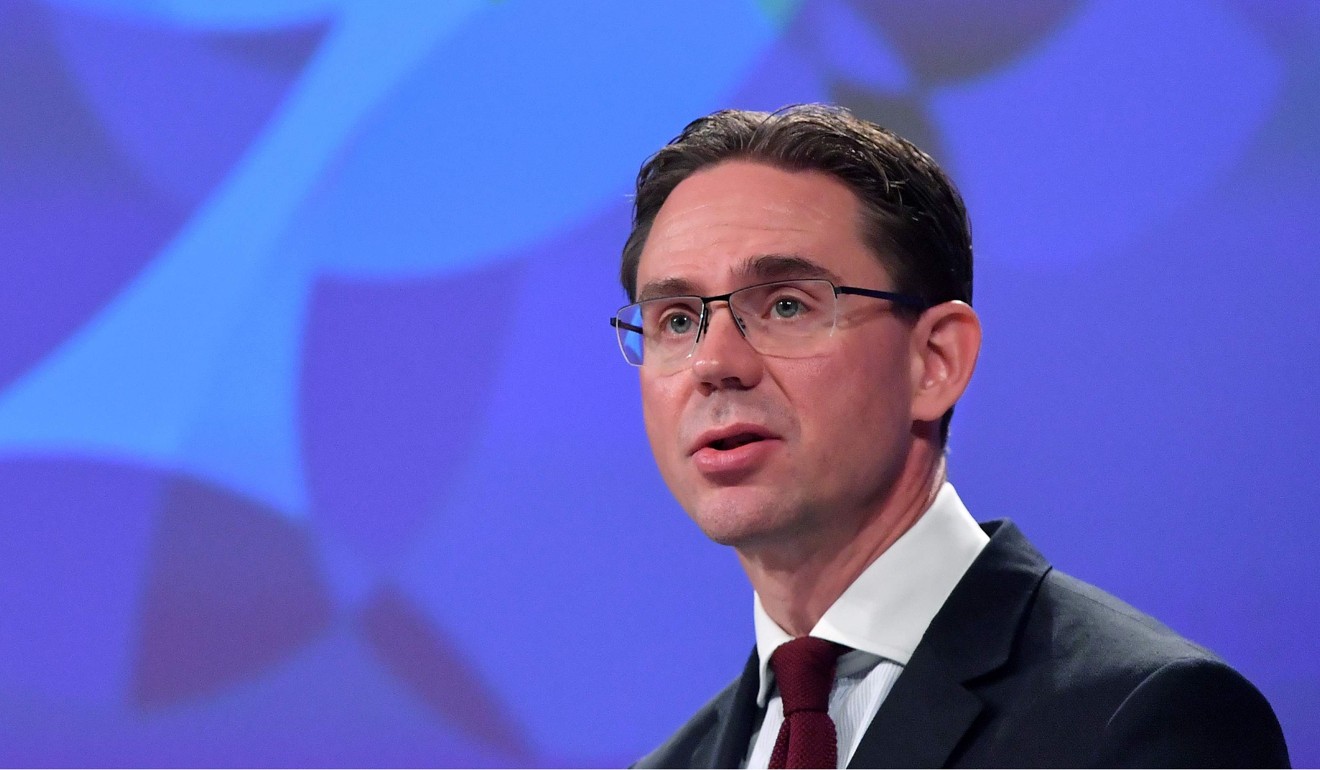
China looks to Europe on WTO reform as pressure builds from ‘united front’
As Beijing and Brussels prepare for meeting next month, EU, US and Japan ‘create coherent point of opposition’ to push it on issues like state subsidies
China is seeking to work with the European Union on WTO reform, but Beijing will still face a “united front” from the US, EU and Japan on contentious trade issues such as state subsidies, analysts say.
Brussels on Wednesday revealed that EU officials will hold a meeting with their Chinese counterparts on World Trade Organisation reform in Beijing on October 9, after it was first raised by China and the EU this summer.
But the same day, the EU also released a joint statement with the US and Japan making their own remarks on WTO reform, criticising forced technology transfers, industrial subsidies and state-owned enterprises – complaints the three major powers often make against China.
Watch: US-China trade war makes European firms nervous
Chinese commerce ministry spokesman Gao Feng responded to the joint statement on Thursday saying Beijing “gives priority to solving problems that threaten the survival of the WTO”, adding that collective problems must be solved through dialogue, and that it does not approve of “individual members imposing their will on others”.
Next month’s meeting is the first for the working group proposed by China and the EU during high-level economic talks in June, partly to address their mutual trade tensions with the United States.
Work with allies to update WTO rules instead of waging solo trade war, former US officials tell Donald Trump
European Commission Vice-President Jyrki Katainen, who met Chinese Vice-Premier Liu He at the talks, said the WTO must be “updated” to prevent unilateral actions like those taken by the US.
Katainen said the EU shared Washington’s concerns regarding Beijing, including industrial subsidies and forced technology transfers, which would be raised during the working group discussions.

Chinese Foreign Minister Wang Yi and EU foreign policy chief Federica Mogherini exchanged views on the WTO on the sidelines of the United Nations general assembly meetings in New York on Thursday, with Wang reaffirming China’s position on WTO reform, state media reported without elaborating.
“My impression is that Beijing feels it can survive bilateral trade tariffs but it is truly concerned at the prospect of possible joint measures that would involve the US, EU as well as potentially the Japanese,” said Hervé Lemahieu, research fellow and director of the Asia Power Index Project at the Lowy Institute.
But he said Japan and the EU still disagreed with Trump’s strategy on the WTO, making the degree to which the US could work with partners against China “the key to the new balance of economic power”.
EU and China need closer ties urgently to offset trade disruption, says bloc’s new ambassador in Beijing
Tu Xinquan, a trade expert at the University of International Business and Economics in Beijing, said “US unilateralism is destroying the WTO and its credibility”, and that China wanted to establish respect for the WTO as a common platform first before discussing details.
“China acknowledges problems like industrial subsidies, but the survival of the organisation should come first,” Tu said.
Kerry Brown, director of the Lau China Institute at King’s College, London, said next month’s meeting was “a strategic move by China to get closer to the EU and try to allay their concerns, but the EU’s relationship with the United States is still very, very strong”.
Watch: China denies Trump’s claim that it is trying to meddle in US elections
He added that disputes between China and the EU could limit what the two sides can agree on at the meeting. “China will find it difficult to have a reassuring answer for the EU on the issue of state subsidies – if the whole thing falls down, it will be on this issue,” he said.
Brown also said the goal of the EU, US and Japan putting on a “united front” was to get flexibility from China on issues like subsidies, but that Chinese industry’s heavy dependence on the state will be difficult to change.
“The point of the statement was to create a coherent point of opposition, which is something China will want to avoid” as talks on WTO reform move forward, he said.
Why the US war on the WTO is a greater threat to global trade than its tariffs attack
Tong Jiadong, a professor of international trade at Nankai University in Tianjin, said China acknowledged the issues listed in the statement, but wanted to address them according to international norms.
“It’s unacceptable that the US has been acting according to its own standards – putting the WTO to one side and instead starting a trade war,” Tong said.
Additional reporting by Wendy Wu

